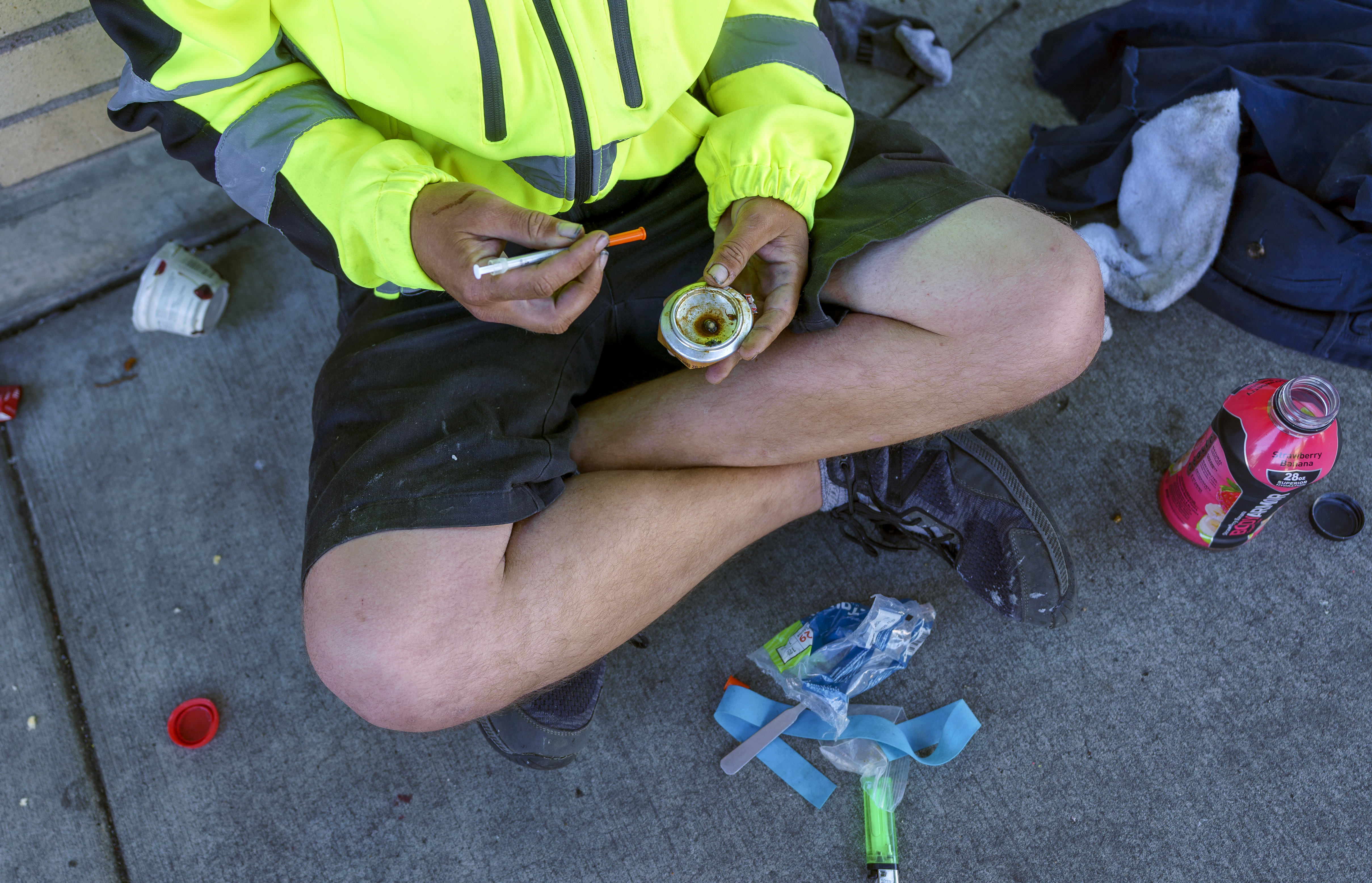
FILE: A man, 23, sits on the sidewalk in downtown Portland, preparing what he says is heroin, June 25, 2021. Measure 110, a drug treatment and recovery act, aims to connect drug users to treatment and recovery services, including housing assistance instead of serving time in jail for possessing small amounts of drugs.
Kristyna Wentz-Graff / OPB
In 2020, Oregon became the first state in the nation to decriminalize the possession of small amounts of illicit drugs with the passage of Measure 110 by voters. The measure also allocates funds from a tax on cannabis to expand access to drug treatment and recovery services. Last September, the Oregon Health Authority announced it had finished awarding the first round of Measure 110 grants — totaling roughly $300 million — to nonprofits throughout the state to pay for peer recovery counseling and other supportive services to help people experiencing substance use disorder.
A new study from Portland State University finds that law enforcement officers across Oregon seem frustrated with Measure 110 and confused about the role they are now expected to play in the interdiction of drugs. Christopher Campbell, associate professor of criminology and criminal justice at PSU and the co-author of the study which was published last month, interviewed 23 police officers and sheriff’s deputies in three urban and three rural counties in Oregon along with his team.
“Officers are largely skeptical about Measure 110′s ability to motivate people to actually voluntarily seek treatment. So, as a result, they’re hesitant to actually provide the citations that Measure 110 requires them to do,” Campbell said.
The citations carry a $100 fine and include a phone number to call for drug treatment assessment. Campbell added that despite the frustration they felt, the officers believed that many of the people they cited actually wanted to enter into treatment programs.
“So they believe that the criminal justice system isn’t necessarily the clear path to getting people towards treatment but they also don’t see another path, they don’t see a clear point of contact,” he said.
Portland Police Chief Chuck Lovell told “Think Out Loud” earlier this month that while officers in the Central Precinct are “focused on writing more of those citations,” he believes Measure 110 has made it harder for the police to crack down on drug dealing, which remains illegal and subject to felony arrests.
“The ability to really do the interdiction side when it comes to the dealing is a little bit diminished and a lot of our efforts around dealing kind of start typically with possession. So with that part being decriminalized, it makes that a little trickier,” Lovell said.
Possession of illicit substances like meth or fentanyl can still result in misdemeanor or felony charges, depending on the amount. Campbell said that the average number of drug possession arrests and citations currently being made are roughly 70% lower than the average monthly possession arrests prior to pandemic.
Campbell and his team did this study through a three-year-long research grant awarded by the National Institute of Justice. An upcoming study will look at the impact of Measure 110 on public safety and include data on drug-related deaths and hospitalizations.
Throughout the nation, overdose fatalities due to opioids like fentanyl have increased since the start of the pandemic. A graph included in the PSU study reveals that although overdose fatalities increased in Oregon since the passage of Measure 110, they also increased nationwide.
“We don’t have enough evidence to suggest that it is just Measure 110 because if it was just Measure 110, then we would see only overdose deaths spiking here in Oregon and everywhere else would be either decreasing from the pandemic or they’d be kind of flatlining,” Campbell said.
Campbell and his research team are currently interviewing district attorneys and deputy district attorneys in Oregon about how Measure 110 has affected their work. That report is expected to be released next year.
Christopher Campbell spoke to “Think Out Loud” host Dave Miller. Click play to listen to the full conversation:


